
- On the eve of the State Services Commission report on Christine Rankin and the
Wairakei incident, Winz Minister Peter McCardle issues a lengthy press statement on the achievements
of Work and Income NZ. His statement highlights a record 9,558 people going off the
domestic purposes benefit (DPB) in the year to June 30. The total of people on the DPB had also
fallen after decades of rising steadily. McCardle: "This is a big turnaround and is due to the new
approach by Winz of case managing each beneficiary. Although it is just nine months old, Winz is
on track to achieve employment results, and the figures prove that..."
McCardle listed other Winz achievements as: a reduction in entrenched long-term (four years or more) unemployment; more than 25,000 people in community work or on the community taskforce scheme; targets for customer satisfaction, accuracy and timeliness have been exceeded, with 86% of customers satisfied.
The Winz target of limiting the rise of registered unemployed to 10,000-12,000 in two years was on course, with a rise of only 6,753 since June 1998.
It had not yet reached its target of limiting Maori registered unemployed to 27% of the register. The present figure is 29.43%.
McCardle reports that as a result of the integration of the offices and staff of the old Employment Service, CEG and Income Support, big cost savings will be made. He estimates that the savings will be $162 million over the next ten years ... largely due to hundreds of staff and fewer buildings no longer being needed. He points out that these savings will not be affected by any change in the number of beneficiaries over the next ten years, nor by any changes to programme funding.
- McCardle acknowledged that much of the training at Winz — central to the State
Services Commission's inquiry — was about case management. But he did not accept he was
pre-empting the Commissioner's findings by applauding the training and its results. McCardle: "There has
been an all-out criticism of Winz over the last week and a half. I'm saying, here are the statistics
that show this department is delivering very significantly and we ought to be aware of that..."
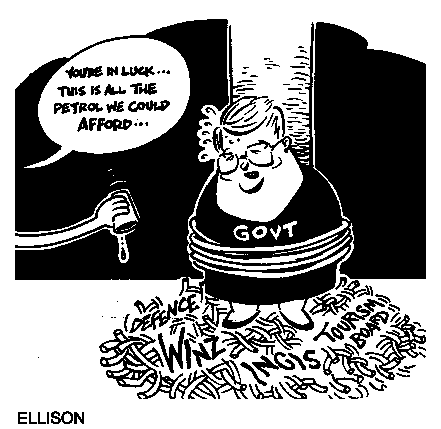
2 August 1999
- Labour leader Helen Clark says that under a government led by her, people can expect
a new era of modesty and asceticism in the public sector, and that more ministerial supervision
of chief executives was needed.
Although Clark was critical of Christine Rankin, she says the government was to blame for the Wairakei affair. Clark: "When you have an organisation like hers serving the poorest in New Zealand, it just isn't on to be living like a king at the management level. The irony is that the woman has behaved as she has because that is what was deemed as appropriate by government. The whole corporate culture she has introduced is one that they wanted. The buck has to come to those who set the climate within which she operates..."
- Green Party co-Leader Rod Donald disputes McCardle's list of "achievements" of
Winz. Donald: "The only reason the number of sole parents on the DPB has dropped is because
Winz tightened the rules last year..."
"As for the long term unemployed, there are now 51% more people who have been out of work for between two and four years than there were in March 1998.
"In an extraordinary example of doublespeak, Winz claims it has `succeeded' in slowing the increase in the number of long-term unemployed to 6,753. It's an appalling indictment on a failing government department which trumpets a rise in long term unemployment of almost 7,000 people because it was expecting the increase to be over 10,000.
"McCardle has also tried to defend his community work scheme, but again Winz is failing to meet targets in this area. There were meant to be between 10,000 and 12,000 people on community work placements at any one time, but the current level is only 9,300..."
- Wellington's Evening Post says that Winz had the option of substantially cheaper air
travel to the Wairakei conference, if it had simply sent managers on scheduled flights. According to
the paper, Winz would have only paid $39,000 on scheduled flights, instead of the $165,000 it
spent on chartering jets.
The Audit Office has been investigating the Wairakei affair for more than two weeks, but has yet to complete inquiries. Meanwhile, an internal Winz report — leaked to the Evening Post — shows that a senior manager was asked in early May to organise the conference and accepted a $165,000 tender from a travel company. The report says that internal telephone records show that the manager didn't contact any major airlines about using scheduled flights. The manager paid a $41,000 deposit. Two Ansett jets were chartered, along with planes from three small charter companies.
Christine Rankin has said she was "misled" over the costs of the charters, but accepts that on May 24 she signed off on $123,000 for the flights. She says she was told that this was the cheapest option, and the $123,000 was the full cost.
The Winz internal report was given to Minister Peter McCardle two weeks ago, but McCardle has said that it wouldn't be made public.
- A government report is released today, under the Official Information Act, which is
critical of the way Winz was set up last year. The report
"Lessons learned from the establishment of
the Department of Work and Income" was compiled late last year by Treasury and the State
Services Commission.
The report says that there was no clear strategy in place before work started on the new department. And the merger was "unnecessarily stressful" for staff, who were made to implement the community wage and other new policies when they did not know if they were going to keep their own jobs.
The report also says that the two main agencies being merged had very different cultures, and disagreed on many things. The staff did not feel their skills were being properly used by the transition unit charged with setting up Winz, and they were alarmed at the use of consultants. The report quoted one staff member as saying the change was "a case study in how not to go about a merger..."
3 August 1999
- Winz chief executive Christine Rankin receives a public censure over the Wairakei
affair. State Services Commissioner Michael Wintringham says she could lose all or part of her
$37,500 performance bonus over her part in the affair. Wintringham: "Money has been central to
this matter, and it will cost Ms Rankin money..."
Wintringham says that Ms Rankin has to submit a plan in the next two weeks addressing the shortcomings he found in how Winz had made spending decisions. He says there was a lack of financial management and "apparent lapses" by Winz in understanding what was acceptable expenditure on a conference. But he stopped short of blaming anyone for over-spending on the Wairakei flights. He says blame for the over-spending will now be dealt with by an Employment Court case being brought by a former Winz manager.
He says the incident has not only eroded public confidence in Winz, but all government departments and agencies. Wintringham: "The cost measured in the damage of credibility has spread beyond the Department of Work and Income. Clearly these events have overshadowed government policy..."
Wintringham did not publicly release his written report to Winz Ministers on the whole affair.
- Wintringham balanced his criticisms of the Wairakei affair, with an endorsement of his confidence in Ms Rankin, saying she is still a competent boss. Wintringham: "I applaud Ms Rankin's forbearance. The key for the Department of Work and Income now lies in moving beyond this and focussing on the good work that it does. I know the department can do that and Christine Rankin is the person who will lead."
- Later, Wintringham tells reporters that to some degree Ms Rankin has already
suffered because of criticism of her management style and dress sense. He says: "I'm not going to
require chief executives to come in the same mould, or look like middle-aged men like me."
"I accept that public officials be the subject of criticism from time to time. But in this case that criticism has descended to ... prejudice such as the style of dress. No public official should be put in a position of having to tolerate that. No one should underestimate the personal distress that these events have caused for Ms Rankin ... In my view some of these attacks have revealed an ugly side to our national state of mind and one of which I hope we will address..."
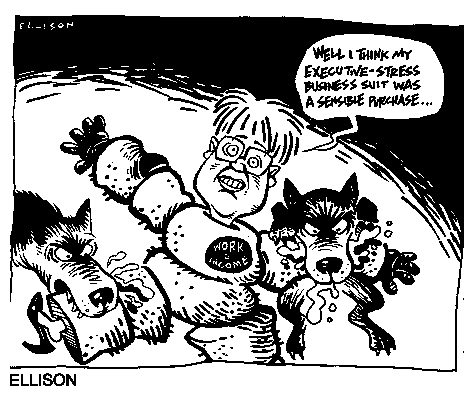
- Prime Minister Jenny Shipley says she is satisfied with Mr Wintringham's actions and other ministers say they hoped the censure of Ms Rankin will send a signal to all government departments to be careful with taxpayer money.
- Labour leader Helen Clark says that a Labour-led government will expect Winz boss Christine Rankin to change her style or get out. Clark says that while Mr Wintringham was Ms Rankin's employer, a new government could influence her performance through its purchase agreement with the department and making it clear to Mr Wintringham that this kind of behaviour would not be tolerated. She says that Labour would be very careful to follow due process. Clark: "I think Ms Rankin is clearly on notice and any kind of serious repeat of behaviour, which has left us aghast in recent weeks, then becomes grounds for a constructive dismissal..."
- Rod Donald says Mr Wintringham's report was disappointing but predictable. Donald:
"The bottom line is that Christine Rankin authorised payments for air charters to a resort hotel
and numerous other extravagances at other conferences. Not only is she responsible for this
expenditure, she personally initiated much of it and should be held to account..."
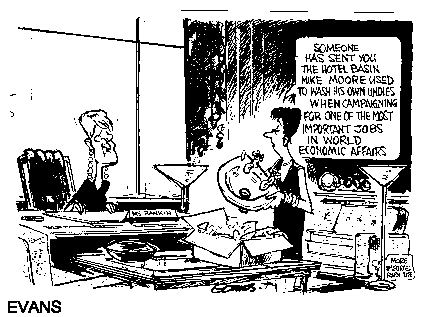
4 August 1999
- Rod Donald makes fresh claims against Winz on TV One's Breakfast programme, saying that the plane charter was small compared to the cost blow-out with Winz's computer system. Donald claims that $16 million has been wasted on the computers. He says he is also gunning for Winz Minister Peter McCardle, for failing to rein in the extravagance.
- One impact of the computer problems is illustrated as a man in New Plymouth complains
to The Daily News that neither he, nor any other local Winz customer, is allowed to use the
Winz office computer to look for job vacancies. He says this has been the case since the
employment support office closed in favour of the one-stop-shop. The man, Iain Woodward, also says
that people in New Plymouth are no longer allowed to use Winz computers to type up CV's or
job applications.
Winz Taranaki regional commission Gloria Campbell says that the public can not use the computer database because it could also be used to look into customer files, and therefore breach customer privacy. Campbell says she does not know when public access to the database would be available but customers may ask their case manager to search the database for them. She says job search computer services are available from a community organisation at another location.
5 August 1999
- The end of the stand-alone Community Employment Group is a tragedy for the people
it helped, according to Finsec union secretary Don Farr. Finsec had been representing two-thirds
of the CEG staff which are now going to be absorbed into the Winz regional structure
(see separate story). Farr: "They believed they would become part of the `benefit police'. Their fear, and
everything we see seems to justify it, is that CEG will be absorbed into work-for-the-dole.
Finsec says that CEG provided a creative, cost-effective service that other countries had copied. They had continued to run with their own national and regional managers after Income Support and Employment Service merged. Farr: "There's never been any criticism of management problems, or lack of accountability ... they worked on the smell of an oily rag."
- The Dominion reports that, in May, Labour Secretary John Chetwin told parliament's Social Services Select Committee that CEG had excellent networks that would be lost if it was seen to be part of the government bureaucracy. Chetwin reported that CEG's work in small towns hit by factory and freezing works closures had continued long after other agencies had left and in his opinion it was vital that its autonomy remained.
- Winz national commissioner Ray Smith says that the strategies, projects and initiatives the group's staff were working on would continue, but there would be greater integration of employment strategy at a national level.
- The Wine Institute of New Zealand, also known as Winz, is considering a name
change because of the worries about "negative connotations" now surrounding the acronym. The
institute's chief executive, Philip Gregan, says they would make the name change for marketing
reasons.
6 August 1999
Student debt protestors march from Auckland University to the Queens St Winz office. Auckland University Students Association president Efeso Collins says they are protesting Winz's poor handling of the student allowance scheme earlier this year as well as the student debt. Police prevented the protestors from entering the Winz offices.
7 August 1999
- Radio NZ's "Focus on
Politics" with Al Morrison features the Winz Wairakei saga,
and takes a critical look at the key performance indicators (KPIs) by which the Winz Ministers
are trumpeting their successes.
Al Morrison also reports that advocacy services have sprung up all over the country to help beneficiaries, who have been denied help from Winz, get what they are entitled to.
Morrison: "The problem developed after 1990 when the then Social Welfare Minister Jenny Shipley cut basic benefits. For those who couldn't survive on them, a bureaucratic web of one-off grants and supplementary assistance was developed. Knowing what you were entitled to, and then convincing Winz to give it to you ... has become a nightmare."
- Mike McKiver, Napier beneficiary advocate, tells Radio NZ: " I have people going through our office in Napier on a continuous basis, frustrated, demeaned, absolutely besides themselves about the manner in which the Winz culture seems to be put upon them." He describes a former employer who was now facing hard times who was shocked at the treatment he and his wife got from frontline staff when applying for a benefit.
- In Palmerston North, the Methodist Social Services wondered why so many
beneficiaries were turning up at its foodbank complaining of treatment from Social Welfare and Winz. It
established an advocacy service to ensure that beneficiaries got first what they were entitled to.
Volunteer Ian Ritchie tells Radio NZ that in the first ten months of the advocacy service (until February this year) they have dealt with 484 clients... and, of these, at least 70% had their entitlements increased from Winz. Ritchie: "They qualified for a benefit, but Winz wasn't giving them their proper entitlement...". Ritchie has over 600 cases on file, including one that went all the way to the High Court before Winz relented.
Ritchie reports that although the advocacy data has not been fully compiled since February, "the level of success" in dealing getting Winz to increase payments has been just over 50%.
Ritchie: "We've heard from ex-Income Support staff that instructions have come from the top that people are not to be told their entitlements. The frequency with which we hear claimants say they were not told what they were entitled to, supports that."
- Al Morrison reports that Winz Minister Peter McCardle sets a "customer
satisfaction" target for Winz of 70%. Morrison: "This means 3 out of 10 people can walk out of Winz's
door without getting satisfaction, and the Minister is satisfied. Isn't that extraordinarily low?"
Peter McCardle, who was also interviewed on the programme, says that department sets itself a target of 80%, and its latest results show that 86% of customers were satisfied. Morrison comments that this "doesn't gel "with the 50-70% dissatisfaction rate that the advocacy services are reporting: "The very fact that there are so many advocacy services, and that they are so busy, tends to back the view that the Winz satisfaction surveys are flawed."
- TV One news highlights the Manawatu Methodist advocacy service claims, saying that Winz is "shutting the door on scores of people who are entitled to a benefit". Christchurch beneficiary advocate Jim Lamb is also featured on the news item, agreeing that Winz "is getting tougher". Lamb: "Certainly for everyone who comes to us, we can see ways in which they could be better assisted. And often this is in things that don't even relate to money..."
- A Winz spokesperson told TV One that staff are trained so that they can deliver the
right advice. The spokesperson also said that there has never been any instructions to staff to
withhold entitlements.
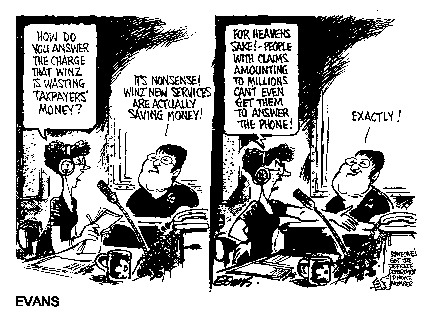
8 August 1999
- The Sunday Star Times reports that Social Welfare spent $52,000 on a four-day
conference at the exclusive Queenstown Millbrook Resort and Country Club. The venue was selected
by Social Welfare director-general Dame Margaret Bazley, and was attended by Winz boss
Christine Rankin and Winz national commissioner Ray Smith. Social Welfare picked up the $52,000 tab
for the venue, support materials and meals for all 24 delegates at the conference.
The paper described Millbrook as Queenstown's most exclusive resort, boasting an 18-hole golf course, European health spa, outdoor jacuzzis, gymnasium and three restaurants, with room rates starting at $253 a night.
- Dame Margaret says that it had been New Zealand's turn to host the biennial conference, which was attended by 19 government department heads from Canada, United States, England, Ireland, and Australia. She says the conference had to be run to an international standard, and was a forum where policy information, experience and expertise were exchanged. Delegates discussed ways of returning people to work, and improving services for the disabled. Dame Margaret says that Millbrook was selected, under her direction, because its package was "highly competitive".
- Labour social welfare spokesman Steve Maharey says that registered unemployment
figures and benefit forecasts show the government's claims of Winz' success "...are pure
fantasy". Maharey releases figures, extracted from official sources, showing steady growth in
registered unemployment and forecast increases in the number of people getting domestic purposes,
sickness and invalid benefits.
Maharey: "The government has been trying frantically to find some good news about its bad news department. Peter McCardle seized on a decline in DPB numbers in the past year as a sign of Winz' `success'. What he failed to confess is that the number of people on the DPB is forecast to increase for the next two years."
Maharey quotes Winz Minister Roger Sowry's replies to Parliamentary questions which show DPB numbers are forecast to increase from 115,517 in 1999/2000 to 118,470 the next year. They are expected rise further to 121,566 in 2000/2001.
Invalid benefit numbers are forecast to rise from 52,183 in 1999/2000 to 53,924 and 55,952 in succeeding years. Sickness benefit numbers are forecast to rise from 34,583 in 1999/2000 to 35,426 and then 36,618.
Maharey: "The number of people on the unemployment benefit is forecast to fall by less than 8,000 over the next two years, while the number on other benefits is expected to go up by almost 12,000. The number of unemployed people on training benefits doesn't budge from 7,708 for two years. You have to figure a lot of those unemployed people are just being shunted onto other benefits.
"Employment Service and Winz statistics show the number of long-term registered unemployed has increased disastrously. The numbers registered for more than one year and more than two years have doubled."
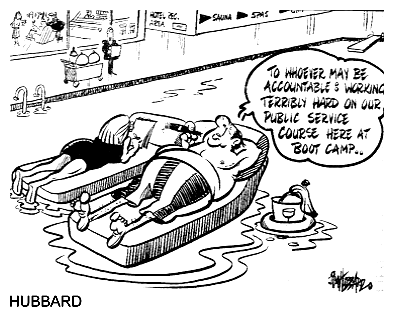
9 August 1999
- Minister of State Services, Simon Upton, says that the "professional, independent and modern" public service deserves better than to be made the butt of election-year posturing. Upton: "Has Mr Maharey paused for even a second to think of the effect his remarks have on the morale of thousands of New Zealanders who do hold dear their public service ethos?"
- Winz Minister Roger Sowry disputes Steve Maharey's figures on the projected growth of beneficiaries. He told The Dominion that the budget projections Maharey was using were now "quite old", and that updates were due out soon and he was confident that the real benefit numbers were "tracking below the estimates".
- The Anglican Bishop of Christchurch says that scandalous over-spending by senior
public servants is a symptom of hardening government policies. The Bishop, the Rt Revd Dr
David Coles, also says that the steady erosion of the Christian character of our society has brought
the country to a point of "social collapse and community crisis".
He says the pursuit of a free-market economy is leading to increasing individualism and a decline in the recognition of the common good. He feels this is expressed most dramatically in the recent scandals over the "spending sprees" of senior officials and executives in agencies that existed for the common good.
10 August 1999
- Adam Gifford in the New Zealand Herald reports that assurances by Winz that its major computer restructuring projects are on target have failed to convince computer industry observers. Winz is $5m into a $38m Focis project, designed to merge the systems from the old Income Support and Employment Service into a single case management tool. Gifford quotes industry sources as saying there was the potential for Winz to repeat the experience of the failed police Incis computer blow-out.
- Green Party co-Leader Rod Donald says that Winz boss Christine Rankin and
national commissioner Ray Smith "don't understand the computer dimension, nor do they have
competent in-house advisors to tell them what they need to know." Donald says that they have
outsourced too much of the work to the computer giant EDS, leaving Winz captive and without
in-house skills to understand its core systems.
Donald: "Couple that with a predilection for style over substance and you have got the ridiculous situation of Winz offices opening with a new corporate look but the computer systems not talking to each other properly..."
- Donald also says that the "job boards debacle", where job boards have been removed
from Winz offices and visitors were expected to use a computer to find out about job
vacancies, showed that management did not understand what computers were good for and what they
were not good for. Donald: "The way the IT systems are working is grossly inefficient and
clearly affecting staff morale..."
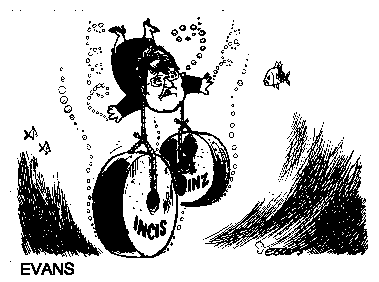
- Winz Minister Peter McCardle puts out another press release quoting Forsyte Research findings that 85% of Winz customers are satisfied with their service. McCardle: "No organisation is perfect. To a degree there will always be dissatisfaction with any welfare system, especially one serving around a million New Zealanders. Some people on a benefit will always be unhappy about the welfare organisation they deal with. However I am absolutely convinced the changes this Government has introduced have led to better service for beneficiaries..."
- The Labour Party demands to know why Winz is in the top rank of corporate spenders
on television advertising when it is a public service organisation with no competitors. The
National Business Review last week showed that the department is ranked fifth in the television ad
spend rankings. It is reported to have spent $178,840 in the week to July 24.
Winz also appears, as NZ Income Support, in the rankings published on July 23. It is ranked 11th for the week to July 10, with reported spending of $261,280.
Steve Maharey: "Winz extravagance puts the department in the list of New Zealand's "top products and services" in terms of ad spending. It's hard to understand why an organisation with no competitors has to spend so much on branding. Beneficiaries have no choice about using Winz' services..."
- Maharey says that Winz has budgeted $1.3 million for the current "Api" ad
campaign. Maharey: "Winz is up there with major corporates like Telecom, Air New Zealand,
McDonald's and Mitsubishi in its spending on advertising. None of this spending is necessary. The
government is wasting money on a vanity campaign for Winz when it could be spent on job creation,
supported employment and apprenticeships..."
11 August 1999
- The Dominion reports that Winz has sent a dead Wellington man a letter demanding he
pay back $21.69 for a superannuation payment covering the day after his death.
The man's daughter, Alison Heerey, says she was dumbfounded by the letter, sent to her father just two weeks after he died of heart failure. She called the Winz collection unit and confirmed the request. Heerey: "He was paid up to June 29, and since he died on June 28 they want a day's worth back that he didn't use ... apparently this is standard practice."
- Winz Minister Peter McCardle hits back at Labour complaints about spending on
advertising. McCardle says that TV ads aimed at attracting vacancies from employers have been run
by the Employment Service for years, and that Labour began the use of them in the
1980s. McCardle: "It is farcical of Steve Maharey to claim to be outraged about Winz's TV ads
when Labour used exactly the same approach. Under Labour, the NZ Employment Service spent
$1.4 million dollars on advertising its services in 1989 alone.
"The NZES began using television to grab the attention of employers and tell them about its jobseekers. The approach worked, just as Winz's current campaign is succeeding in reaching its target market. Research showed the need for higher awareness among employers about the jobseekers that Winz can provide. And they are getting the message. As a result of the ads the number of calls to Winz from employers with vacancies has doubled. The ad campaign is succeeding, and that is why it will continue..."
- The Independent features continuing accusations by Rod Donald of wasted spending on the Winz computer system. Rod Donald tells the paper that $16m of completed work on the computer systems has had to be flagged away.
- The Alliance's Grant Gillon reveals that, since November 1998, Winz boss Christine
Rankin has spent $25,000 making five videos to communicate with her staff.
Gillon: "Rankin says she considers this method to be one of the most effective ways to communicate to large numbers of staff across the country. Has she never heard of email, faxes or letters? I suspect that a video is a more glamorous method of communication that fits nicely with Christine Rankin's preferred management style than any cost effective way to informing staff ..."
12 August 1999
- The Minister of Defence Max Bradford has "fined" Defence chiefs $200,000 for sending
60 staff to the $657-a-head Masters of Business seminar in May. Bradford says that Defence
chief Air Marshall Carey Adamson had advised him "with regret" that the department spent $39,447
on the seminar. Bradford: "The number who attended was clearly unacceptable. I have expressed
the government's deepest displeasure at both the expenditure and how this could have happened..."
A number of other government departments had also paid for seats at the seminar including Winz, ACC, Transfund, Timberlands and Te Puni Kokiri. Winz had spent $5,910 on sending 18 staff to the same event, taking what it said was the cheapest option available.
- As "punishment", Bradford says he will cut the Defence Force's personnel development budget by $100,000 a year for two years. Commentators say that Bradford's tough response is intended partly as damage control, as the government faces another embarrassing case of overspending in the public sector. Bradford told the Evening Post that the government faced "something deep inside the psyche of many public servants, that really suggests they are not looking for value for money."
- Labour's Steve Maharey says that Max Bradford can't duck responsibility for the state
of the public service. Maharey: "The extravagance at Winz and Defence is unacceptable, but
public servants are splashing out like private sector executives because that's what this
government wanted. It told them to follow the private sector model, so that's what they've done. Dumping
on them like Mr Bradford has done is like telling your children to run wild then turning on
them when the neighbours complain..."
Maharey says Labour would reassert the role of government as the owner of the public service rather than just a purchaser of services: "We'll tell them to stop. Its really that simple."
- New Zealand First Defence spokesman Ron Mark complains that cutting $200,000 from the Defence's personnel training budget will only punish the troops — who never went to the seminar. He suggests Max Bradford dock the pay of all the officers who authorised and attended the "glitzy seminar".
- Winz says that human error caused a letter to be sent to the dead man asking for the
return of $21.69 of his superannuation money. Winz would not say whether it intended to wipe the
debt. Wellington communications adviser Christine Romanes told
The Dominion that "Winz is obliged by government to seek recovery of all overpayments and doesn't have any discretion over what
it can and can't recover..."
13 August 1999
- The New Zealand Herald describes Max Bradford's $200,000 "fine" on Defence as
"ministerial overkill". In an editorial, the paper says: "Rightly, they have been castigated for their
unacceptable behaviour, just as the chief executive of Work and Income was censured recently
for lavish conference spending ... but regrettably, the punishment leveled by the Minister smacks
both of the knee-jerk and of politicking. Mr Bradford would have been better advised to ask for
an immediate audit of the budget to discover whether there are further examples of
ill-conceived spending..."
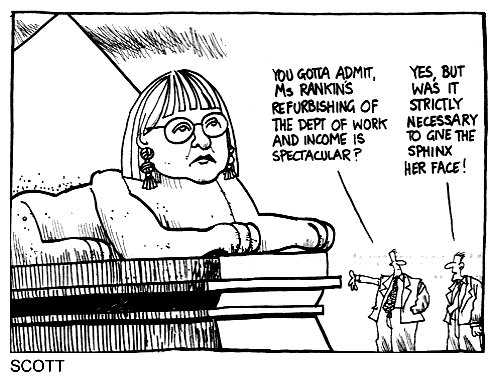
- Another department is heavily criticised in the press over heavy expenditure on training.
In a front-page feature in the National Business
Review, Internal Affairs is accused of
spending nearly $2m on a "focussed-change" programme in which employees sang karaoke, donned
t-shirts with grisly-bear slogans and sumo wrestled in giant rubbery suits — all before restructuring
even started. NBR accuses Internal affairs secretary Roger Blakeley of raiding various divisions
within his department in order to pay for the costs. The three-year change programme, which is said
to have lowered staff morale, lived off borrowed funds from a variety of internal operations after
the cabinet said the department could have no more money.
American consultant Wayne Widdis of Focus Change International was brought in by Internal Affairs to oversee the programme. All staff were put through five-day and three day motivational workshops. The NBR says the idea was to change departmental "mindsets" before introducing changes such as the restructuring of the heritage group and closing of the customer service centres. Some Internal Affairs staff told the NBR that the programme met mixed reactions, including strong negative feelings. Some staff accused the programme of brainwashing and intimidation of other staff who did not support the programme.
A "business change plan" asking for $17m for the restructuring was rejected by Cabinet in June 1997 — and by that time $1.45m had been officially spent. Staff today put the figure at $2m.
- In an editorial, NBR says:
"It made sense for the incoming chief executive, Roger
Blakeley, to try and change the Internal Affairs culture from public disservice to enterprise. His
"programme" was intended to create a new departmental culture. Instead, it unnerved the
long-standing bureaucrats who inhabit the dogs-body department and fostered widespread ill-will.
"Managers, far from being catapulted into the free market age, became more concerned about job preservation and outright survival. But the programme had a more serious downside: to fund the ever-increasing bills, Dr Blakeley was forced to rob Peter to pay Paul. Hence, some of the better units in the diverse department, such as National Archives, found they were paying for some of the wackiest training sessions ever undertaken by a public sector CEO."
14 August 1999
- Internal Affairs confirms that it spent $1.75m on a staff training programme.
However, secretary Roger Blakeley rejected reports that money had been spent on unusual activities such
as cake-baking competitions, indoor surfing, and sumo wrestling. He says these activities were
paid for by the department's social club.
Roger Blakeley describes the NBR article as "a very mischievous piece of writing, highlighting only the lighter aspects of a serious departmental restructuring programme." He says the programme was carried out within existing budgets, and had resulted in big savings for the department.
The Internal Affairs spokeswoman says that the money was spent on 18 workshops for 865 staff, who were taught business and personal development skills, strategic planning, time and project management and performance management. The courses were designed by American consultant Wayne Widdis, who withdrew from the project, after being paid $290,000, apparently because of differences over the department's direction.
- Former Internal Affairs Minister Peter Dunne says he supported the goal of the
programme to chart a better strategic path for the organisation, but he had feared it could become "too
lavish and grandiose". He says he had been uncomfortable about the "touchy feely" element of
some training exercises.
15 August 1999
- Peter McCardle issues a press release saying he is angry that the Winz controversy is
overshadowing the success Winz has had with DPB numbers. He points out that record numbers
of people have been moved off the DPB and into work, saving tens of millions of dollars ...
and Winz has played a big part in it through the new approach of intense case-management.
16 August 1999
16 August 1999
- In an open letter to state sector chief executives, State Services Minister Simon Upton says that cases of spending have come to light "that are clearly outside what we as Ministers and taxpayers at large consider to be acceptable". He stopped short of saying he would change any rules, and made no specific mention of the Winz Wairakei affair, or the Defence spending on the Masters of Business seminar.
Upton says that cases of poor spending might have been isolated, but they seriously undermined public confidence that taxpayers' funds were being spent wisely and well. While contracts with chief executives concentrated on outputs, Upton says Ministers were entitled to expect due regard for the interests of the taxpayer and the need for economical and appropriate spending.
Upton: "Faced with public disquiet, there is a temptation to become ever more prescriptive about what is and isn't appropriate. But that would be to reduce the issue to a technical paint-by-numbers approach..." "What we need is the conscientious application of an ethic that puts taxpayers' interests first on all occasions. If you can defend your actions according to this test, you will have our support. If you are ever in doubt - and there will always be borderline cases - please consult the State Services Commissioner."
- The Dominion reveals that Winz has spent about $100,000 on temporary office signs that had to be thrown out less than ten months later when it shifted premises. The amount of money spent on temporary signs is expected to rise to about $273,000 by June 30 next year as the service carries out it plans to vacate another 58 offices. Winz spokeswoman Kate Joblin says that temporary signs costing about $3,000 each were put up at 91 of the 219 Winz sites, last October. Because the new offices needed to be re-branded within 60 hours, glue was used to attach the temporary signs, meaning that they could not be re-used once the offices were vacated.
- Labour's Steve Maharey tells the New Zealand Herald that he can find no evidence that Winz's $38m Focis computer project has been mishandled. He was commenting on claims by Green co-Leader Rod Donald that Winz may have wasted $16m on what would be another public computer project failure.
Maharey says that Labour has so far been unable to substantiate the claim. Maharey: "I get the impression he is poking around in the dark like everyone else... Rod and Grant Gillon undermine the whole Winz area a bit, because they both seem to say whatever comes into their heads. " Maharey says Labour will only say what it can prove - and he concedes that on the computer project at the moment that doesn't amount to anything: "We are trudging our way through a lot of questions to see if we can track down what all these rumours are about, but so far we haven't turned up anything that is significant." 17 August 1999
17 August 1999
- Winz has wiped the debt it tried to recover from a dead Wellington man, but his daughter is still unhappy with the system and wants government intervention. Alison Heerey says that since going public with her story, she has received telephone calls of support from many people upset that they had been in a similar situation. She says she doesn't blame the department for it, because they don't make the rules. She has written to Winz Minister Peter McCardle to intervene and change the rules. She says Winz should wait longer before asking families to pay back the money, or write off the debt and stop the superannuation from the time of the next due payment.
Peter McCardle declined to comment, saying it was an "operational matter". 19 August 1999
18 August 1999
- Former Winz Manager Aneta Wineera has lodged papers with the Employment Court. She had announced on July 30, through her lawyer, that she would sue Winz for damages, alleging Christine Rankin had constructively dismissed her by breaching her employment contract. No date has been set for the hearing.
- Rod Donald reveals that Winz has paid almost $250,000 for empty offices since it was formed last October. The information was provided by Winz Minister Peter McCardle in response to a written parliamentary question.
McCardle says that the rationalisation of front line sites has been accelerated from three years to one year. "This has resulted in a $1m cost saving in rents for 1999 and a projected further saving of $1m in the year 2000."
Donald: "The Minister however concedes that rent paid for vacant offices totals $221,748 since October 1 and continues at the rate of $34,290, presumably per month. The money wasted on empty offices highlights the very poor forward planning surrounding the Income Support merger to Winz. The least Winz could do is offer the empty offices to cash strapped community groups, struggling to meet the needs of people who are casualties of government policy..."

Top of Page
This Letter's Main Page
Stats | Subscribe | Index |
The Jobs Letter Home Page | The Website Home Page
jrt@jobsletter.org.nz
The Jobs Research Trust -- a not-for-profit Charitable Trust
constituted in 1994
We publish The Jobs Letter


Letter No.106
23 August, 1999
1 August 1999









